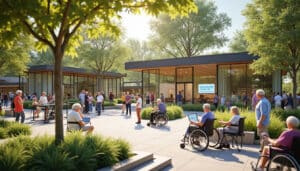The Alzheimer’s disease represents a major challenge for many families and society as a whole. Within specialized facilities, the Alzheimer’s unit proves to be an essential device, offering a suitable framework for people suffering from this condition. In addition to providing secure accommodation and personalized support, these units play a crucial role in research and the implementation of innovative solutions aimed at improving patients’ quality of life and better understanding the issues related to this disease.
In the field of gerontology and health, the Alzheimer’s unit (UVA) plays a crucial role in supporting individuals with Alzheimer’s disease or other cognitive disorders. These units are designed to provide a secure environment tailored to the specific needs of residents while promoting their autonomy and quality of life.
An Alzheimer’s unit is often defined as a dedicated space within a Residential Establishment for Dependent Elderly People (EHPAD). It groups a limited number of residents, usually between 10 and 20, in order to ensure personalized support. Each resident benefits from services adapted to their condition, including targeted therapies to improve their well-being and reduce behavior disorders associated with the disease.
The main missions of an Alzheimer’s unit include alleviating symptoms, improving residents’ quality of life, and preserving their autonomy. These goals are achieved thanks to a reassuring atmosphere and activities that stimulate cognitive, social, and physical engagement. Furthermore, the unit promotes maintaining family bonds, allowing relatives to actively participate in the resident’s life.
The staff working within these units consists of professionals specifically trained in the care of neurodegenerative diseases. Specialized doctors, nurses, nursing assistants, psychologists, and therapists work together to create a supportive environment. They implement rigorous medical monitoring by adjusting treatments according to the evolving needs of the residents.
Another significant function of an Alzheimer’s unit is the support provided to the families of the residents. These services include psychological support to help caregivers manage the stress, guilt, and anxiety often associated with a loved one’s disease progression. By facilitating communication between families and caregivers, the unit contributes to a better understanding of the transformations related to the disease.
Research in gerontology is also interested in Alzheimer’s units. Many studies focus on improving care practices, implementing new treatments, and identifying best intervention practices. The results of this research are essential for guiding the evolution of health policies and developing new support methods aimed at improving the lives of residents and their families.
Alzheimer’s units are often equipped with monitoring and alarm systems to ensure the safety of residents. These technological systems are integrated into the daily life of the accommodation facilities, allowing them to remain connected to their family environment. They play a fundamental role in reducing the risks of accidents and escapes, which is essential for a vulnerable population.
Finally, it is important to mention the significance of ongoing training for the staff of Alzheimer’s units. This training should be regularly updated to include the latest advances in the field. Organizations thus offer suitable training programs, enabling these professionals to stay informed about best practices and scientific innovations.
In conclusion, the Alzheimer’s unit represents a significant advancement in supporting individuals with cognitive disorders. Thanks to trained staff and an adapted environment, it contributes to improving residents’ quality of life and supporting their families. The development of research in this area promises to further optimize interventions and strengthen the positive impact of these units.

FAQ – Understanding the Alzheimer’s unit: definition and role in research
What is the main role of an Alzheimer’s unit? The main role of an Alzheimer’s unit is to preserve the quality of life of residents by providing appropriate support and promoting their autonomy, while reducing behavior disorders associated with the disease.
What are the characteristics of an Alzheimer’s unit? An Alzheimer’s unit is characterized by a specific architecture that includes secure spaces, adapted activities, and qualified staff specialized in the care of Alzheimer’s disease.
How does an Alzheimer’s unit help families? An Alzheimer’s unit provides families with peace of mind knowing that their loved one is cared for by professionals and benefits from a safe and stimulating environment.
What types of activities are offered in an Alzheimer’s unit? Activities in an Alzheimer’s unit may include cognitive stimulation sessions, leisure activities such as dance or painting, as well as daily life tasks to encourage residents’ autonomy.
What staff works in an Alzheimer’s unit? The staff in an Alzheimer’s unit is composed of diverse professionals, such as doctors, nurses, nursing assistants, and other specialists trained to meet the needs of individuals with Alzheimer’s disease.
What are the admission criteria for an Alzheimer’s unit? Admission criteria include the presence of symptoms of Alzheimer’s disease, significant behavior disorders, and a refusal to stay at home due to potential risks.
Is there a cost associated with admission to an Alzheimer’s unit? Yes, admission to an Alzheimer’s unit is generally more expensive than in other units of the EHPAD due to the specialized services offered, but funding like APA may be available to help cover costs.











